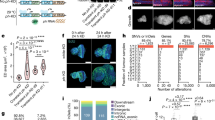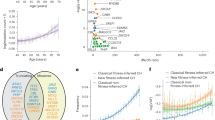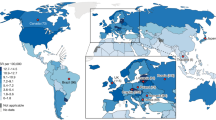Abstract
THE growth of knowledge about DNA replication and repair in bacteria has been aided by the availability of a series of mutations specifically affecting these processes. Almost invariably, defects in repair processes result in an alteration in the sensitivity of cells to ionising radiation and other mutagenic agents. Knowledge is much less advanced for animal cells, although information has been obtained using cells from patients with, for example, xeroderma pigmentosum which have provided six possible mutants in DNA repair1,2. The diseases classified as chromosome breakage syndromes—ataxia telangiectasia (AT), Fanconi's anaemia and Bloom's syndrome—may also provide a rich source of DNA metabolic mutants. The frequent association of defective DNA metabolism with mutagen sensitivity has suggested an approach to the study of chromosome breakage syndromes. Finkelberg et al.3 have found that Fanconi's anaemia cells are abnormally sensitive to mitomycin C (MC). We have now used this approach to determine whether cells from AT patients are potentially defective in DNA metabolism. We examined their sensitivity to actinomycin D, MC and methyl methane sulphonate (MMS), and the results indicate that AT cells are clearly more sensitive to actinomycin D and that responses to MMS and MC are more variable.
This is a preview of subscription content, access via your institution
Access options
Subscribe to this journal
Receive 51 print issues and online access
$199.00 per year
only $3.90 per issue
Buy this article
- Purchase on Springer Link
- Instant access to full article PDF
Prices may be subject to local taxes which are calculated during checkout
Similar content being viewed by others
References
Kraemer, K. H., et al., Mutat Res., 33, 327–340 (1975).
Lehmann, A. R., et al., Proc. natn. Acad. Sci. U.S.A., 72, 219–223 (1975).
Finkelberg, R., Thompson, M. W., and Siminovitch, L., Am. J. human Genet., 26, 30A (1974).
Goldstein, S., and Littlefield, J. W., Diabetes, 18, 545–549 (1969).
Stanners, C. P., Eliceiri, G. L., and Green, H., Nature new Biol., 230, 52–54 (1971).
Reich, E., Science, 143, 684–689 (1964).
Bacchetti, S., and Whitmore, G. F., Biophys. J., 9, 1427–1445 (1969).
Pater, M. M., and Mak, S., Nature, 250, 786–788 (1974).
Hoar, D. I., and Suzuki, D. T., Can. J. Genet. Cytol., 8, 353 (1966).
Suzuki, D. T., Genetics, 51, 11–21 (1965).
Taylor, A. M. R., et al., Nature, 258, 427–429 (1975).
Legator, M. S., and Flamm, W. G., A. Rev. Biochem., 42, 683–708 (1973).
Paterson, M. C., Smith, B. P., Lohman, P. H. M., Anderson, A. K., and Fishman, L., Nature (in the press).
Author information
Authors and Affiliations
Rights and permissions
About this article
Cite this article
HOAR, D., SARGENT, P. Chemical mutagen hypersensitivity in ataxia telangiectasia. Nature 261, 590–592 (1976). https://doi.org/10.1038/261590a0
Received:
Accepted:
Published:
Issue Date:
DOI: https://doi.org/10.1038/261590a0
This article is cited by
-
Ataxia-telangiectasia: an inherited disorder of ionizing-radiation sensitivity in man
Human Genetics (1987)
-
Patients with tuberous sclerosis have fibroblasts with normal limits for growth characteristics and sensitivities to DNA alkylating agents
Japanese Journal of Human Genetics (1984)
-
The sensitivities to radiations and radiomimetic chemicals of cells from patients with ataxia telangiectasia
Japanese journal of human genetics (1983)
-
Bleomycin-resistant DNA synthesis in ataxia telangiectasia cells
Nature (1981)
-
Genetic and biochemical studies with ataxia telangiectasia
Human Genetics (1981)
Comments
By submitting a comment you agree to abide by our Terms and Community Guidelines. If you find something abusive or that does not comply with our terms or guidelines please flag it as inappropriate.



